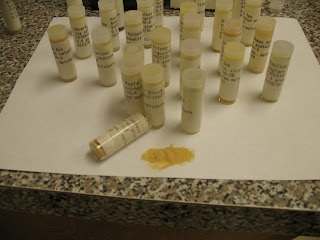

Top left, is Jan Allen, our certified pollen counter. Top right is a sample of pure cypress (tree) pollen. Note all tree, grass, and weed pollen samples in the vials are yellow. Bottom left is all of our pollen samples, reference slides, and reference photos. This is the largest collection of purified pollens in the entire state of South Carolina, to my knowledge. Bottom right is me checking the pollen slide for today's count. This is how we get the counts, that we send to the local newspapers. My office is the only certified pollen counting station in the state of South Carolina.











2 comments:
I've heard that taking a tsp/day of locally made honey will help build up immunity to pollen - this seems to make sense, but do you know this to be true and if so, how local does the bee keeper have to be? I live in a boro of NYC & bee keeping is not allowed; therefore, would honey from close by in NJ be as beneficial?
There is no proof via published studies that locally-produced honey can reduce allergy symptoms. I've been asked this many times. I don't object to my patients trying honey. Personally I love the taste. Please search for the entry "honey".
Respectfully,
NK
Post a Comment